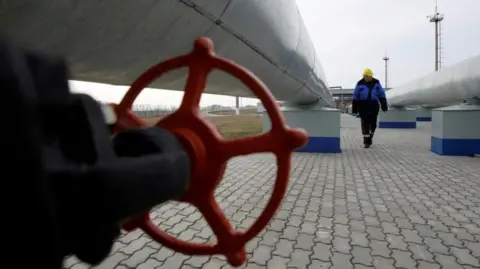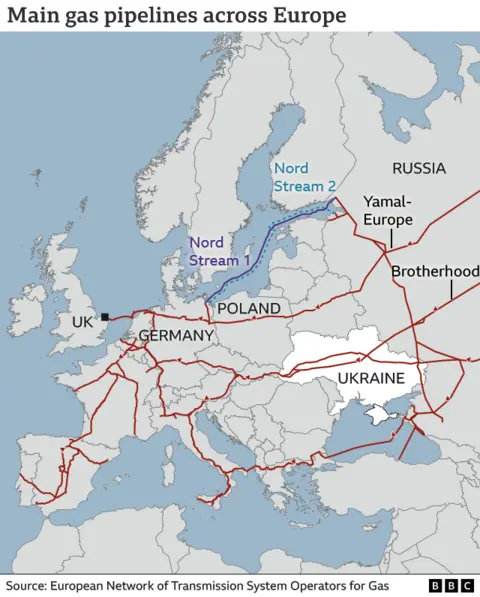Era of cheap Russian gas to EU ends as transit across Ukraine stops
 Reuters
ReutersRussian gas has stopped flowing to EU states via Ukraine after a five-year deal expired, marking the end of a decades-long arrangement.
Ukrainian President Volodymyr Zelensky said that his country would not allow Russia to "earn additional billions on our blood". Poland's government meanwhile said the cut-off was "another victory" against Moscow.
The European Commission said the EU had prepared for the change and most states could cope. Moldova, which is not in the EU, is already suffering shortages.
Russia can still send gas to Hungary, Turkey and Serbia through the TurkStream pipeline across the Black Sea.
Russian company Gazprom confirmed that gas exports via Ukraine to Europe stopped from 08:00 local time (05:00 GMT) on Wednesday.
Moscow has transported gas to Europe through Ukraine since 1991.
While immediate effects are light, the strategic and symbolic impact for the whole of Europe is enormous.
Russia has lost an important market, but its president, Vladimir Putin, says EU countries will suffer most.
The EU has significantly reduced imports of gas from Russia since it launched its full-scale invasion of Ukraine in 2022, but a number of eastern member states still depend largely on the supplies, making Russia about €5bn ($5.2bn; £4.2bn) a year.
Russian gas was less than 10% of the EU's gas imports in 2023, according to the bloc. That figure was 40% in 2021.
But several EU members, including Slovakia and Austria, continued to import significant amounts of gas from Russia.
Austria's energy regulator said that it did not forecast any disruption as it had diversified sources and built up reserves.
But the end of the transit deal has already caused serious tensions with Slovakia, which is now the main entry point of Russian gas into the EU and earned transit fees from piping the gas on to Austria, Hungary and Italy.
Slovakia has said it will pay more for alternative routes. Its energy regulator announced in early December that Gas prices for consumers would rise in 2025.
Robert Fico, Slovakia's prime minister, said on Wednesday that the end of the deal would have "drastic" consequences for EU countries, but not on Russia, Reuters reported.
On Friday, Fico - who had just made a surprise visit to Moscow for talks with Putin - threatened to stop supplying electricity to Ukraine.
This prompted Zelensky to accuse Fico of helping Putin "fund the war and weaken Ukraine".
"Fico is dragging Slovakia into Russia's attempts to cause more suffering for Ukrainians," the Ukrainian president said.
Poland has offered to support Kyiv in case Slovakia cuts off its electricity exports - supplies that are crucial to Ukraine, whose power plants come under regular attack from Russia.
Polish foreign minister Radoslaw Sikorski told BBC Radio 4's Today programme there were alternative gas supply routes from international markets, such as a terminal in Croatia and connections from Germany and Poland.
"These routes should be explored so that Russia doesn't make money on selling oil and gas to the European Union," Sikorski said.
Poland is importing gas from the US, Qatar and the North Sea, he added.
"As far as I understand, all countries have alternative routes," he said.
Moldova - which is not part of the EU - could be seriously affected by the end of the transit agreement. It generates much of its electricity at a power station fuelled by Russian gas.
It also supplied the Russia-backed breakaway region of Transnistria, a small sliver of land sandwiched between Moldova and Ukraine where around 300,000 people live.
Russian gas company Gazprom had said on 28 December it would restrict gas to Moldova on 1 January because it said it had failed to fulfil its payment obligations.
Dorin Recean, Moldova's prime minister, denied the alleged debt and accused Russia of using "energy as a political weapon" in a social media post. He said the move would leave Transnistria "without light and heat in the middle of the winter".
Heat and hot water was cut off to Transnistria "due to the temporary cessation of gas supplies" at 07:00 local time (05:00 GMT) on Wednesday, energy company Tirasteploenergo said on Telegram.
It urged residents to dress warmly, gather family members together in a single room, hang blankets or thick curtains over windows, and use electric heaters.
The temperature was due to drop below 0C on Wednesday night. Medical institutions and hospitals were still being supplied, the company said.
Moldova's energy minister, Constantin Borosan, said his government had taken steps to ensure stable power supplies, but called on citizens to save energy.
A 60-day state of emergency in the energy sector has been in place since mid-December.
President Maia Sandu accused the Kremlin of "blackmail" possibly aimed at destabilising her country before a general election in 2025. The Moldovan government also said it had offered aid to Transnistria.
The EU has found alternative sources in liquefied natural gas (LNG) from Qatar and the US, as well as piped gas from Norway, since Russia's invasion of Ukraine.
In December, the European Commission laid out plans to entirely replace gas transiting through Ukraine.

